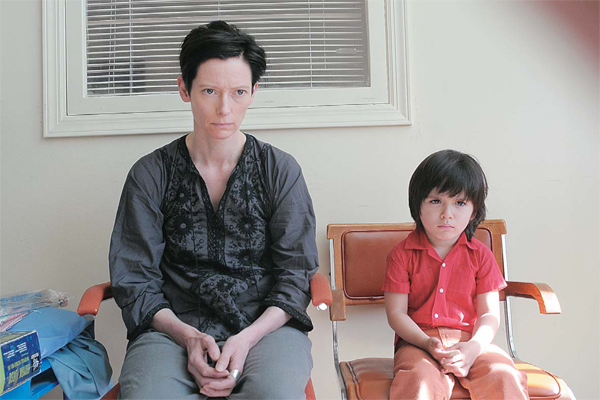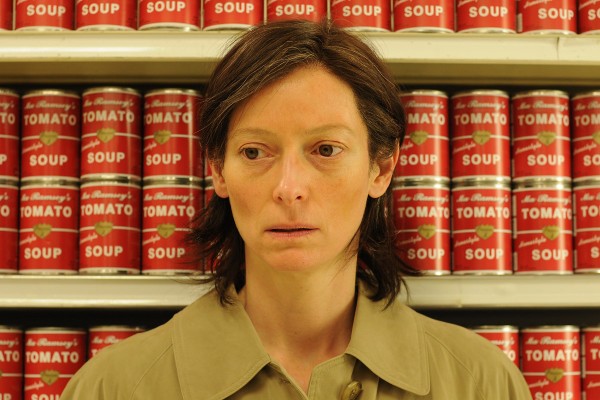We Need to Talk About Kevin Review
It’s hard — impossible really — to understand why a person would commit an atrocity like a mass killing. We understand loneliness, anger, desperation — but what pushes someone that far over the edge? So often we chalk it up to mental illness, often to avoid the discomfort of attempting to fathom that kind of empathy. “We Need to Talk About Kevin” stares this notion down through the lens of a mother’s grief, guilt and self-inflicted punishment.
The subject matter isn’t an easy one, and not because of the sensitive topic, but because it’s so hard to relate to any scenario that could possibly lead down such a dark path. Scottish filmmaker Lynne Ramsay dares to lead the way, crafting one of the most emotionally challenging film experiences you’ll ever have. “Kevin” is frustrating, horrifying and difficult to sympathize with it, while also chillingly poetic and visually poignant.
Ramsay, who directs a script she co-adapted from Lionel Shriver’s book, boldly and beautifully weaves together different parts of the mother, Eva’s (Tilda Swinton), story. There’s the tortured present-day Eva trying to live with all this, her flashbacks to the day her son Kevin (Ezra Miller) commits a school massacre, and scenes that recount pivotal moments between Eva and Kevin from Kevin’s birth until the tragedy.
The cinematic craftsmanship used to tell this chronologically disoriented narrative as well as the unfiltered and stripped performance of Swinton keep the film in a certain realm of excellence that the story might otherwise shatter. It’s so difficult to believe the implied notion of Kevin essentially being the spawn of Satan and that Swinton could be so clueless as to lack all maternal and disciplinarian instinct in handling the situation.
Eva is a character we sympathize with in the present day but whom we grow to dislike to an extent as we learn more and more about Kevin’s upbringing. Post-massacre, for whatever reason, she continues to live in the town affected by her son’s actions. Her new home has received a coat of red paint splattered across the front door, and she spends all her free time cleaning it off. In isolation, memories of raising Kevin, implicitly ones in which she wishes she could change what she did, flow freely in and out of her conscience.
As a baby, Kevin wouldn’t stop crying in his mother’s arms and postpartum depression ensued. As a toddler, Kevin refused to comply with basic requests and tasks yet exhibited no signs of autism or behavioral disorders. He wasn’t potty-trained until he was what looks like eight, quite possibly because he wanted the attention. His relationship with his mother only grew more distant as she didn’t know how to respond to these outbursts.
The nature of Kevin’s malevolence in some way is exaggerated because we’re to recognize that much of how we are seeing Kevin is through his mother’s recollections after the massacre. She’s blamed herself for not seeing all the signs and has manifested that guilt into her memory. Nevertheless, we as viewers struggle mightily with embracing it as truth.
Perhaps the fact of the matter is that in order to create a character capable of such real-world evil, Kevin needed to be more extreme than any character we’ve ever seen. Miller gives Kevin with some believable rebellious teenage qualities, namely in the way he talks to his mother, but he’s also portrayed with a near-supernatural darkness reminiscent of a horror film.
What we can understand is Eva’s inner monologue. We don’t agree with it in a lot of the Kevin scenes, but Swinton grants us unfettered access into Eva’s every thought. This gives Ramsay a greater degree of freedom in her use of visual symbolism. Nearly every scene is rife with metaphor, and our ability to identify Eva’s every emotion through Swinton’s performance allows Ramsay the ability to communicate through more abstract means.
From the opening scene onward we are treated to images of messiness and disarray, of raw, pulpy filth and even mild self-mutilation. It both informs and aggravates the story being told, which adds to the difficulty of enduring its 112 minutes.
For some, the challenge will be too great to bear, but for others, namely those who can key in on Swinton’s performance and Ramsay’s expert imagery, “Kevin” will be one of 2011’s finest films.
4/5 Stars
We Need to Talk About Kevin
Directed by Lynne Ramsay
Written by Lynne Ramsay, Rory Kinnear, Lionel Shriver (book)
Starring: Tilda Swinton, John C. Reilly, Ezra Miller







0 Comments
You can be the first one to leave a comment.